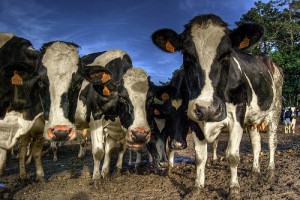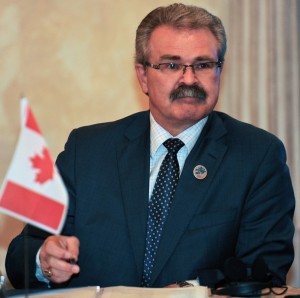More sick people have been identified in Alberta and a Regina restaurant has closed as links to the XL Foods E. coli O157 outbreak continue to grow and the criticism increases across Canada.
At least 10 people are sick in Alberta, with five positively linked to the E. coli O157:H7 from XL.
A Regina restaurant has voluntarily closed after five cases of E. coli O157 were linked  to the restaurant; testing is on-going and no insights revealed into suspected foods.
to the restaurant; testing is on-going and no insights revealed into suspected foods.
Five of the Alberta cases are linked to steaks produced by XL and sold at Costco in Edmonton.
According to the Edmonton Journal, Matthew Harrison arrived at his friend Mike Lees’ home for a barbecue.
He took along a package of Costco Kirkland strip loin steaks bought at the northeast Edmonton store on 50th Street.
Within about a week, three people who ate steak at the family barbecue were sick with stomach pains and bloody diarrhea: Harrison; Mike’s five-year-old son, Elijah; and Mike’s mother, Pat Lees, who lives in Grande Prairie.
“For us, we wanted to know how all three of them got sick,” Mike Lees said. “That was the one meal for certain that we shared together.”
Harrison, 30, said he plans to file a lawsuit against XL Foods and will ask a judge to certify that lawsuit as a class action, to allow other people to join. “There have to be more checks and balances set up for people to be accountable for this. That meat should never have left the plant,” he said.
By yesterday, more than 1,500 products with XL beef had been recalled.
The company has refused to comment, which is fairly outrageous.
And an anonymous expert told the Calgary Herald that if there is a sudden increase in positive tests in a batch of lots or on a particular day, it’s a warning sign contaminated product isn’t being caught, adding, “There is no guarantee any of the meat is safe when you have a heightened level of positives. You can cook it into chili or dump it in a landfill, but you should not be sending any of it to market without further testing.”
How is anything going to change if experts won’t be identified?
The Herald also reports an outside audit of the plant by Silliker Inc. in May found that sampling of trim product was “inconsistent” with the standard that 60 pieces be taken from each tested lot.
Those results from earlier were posted on XL’s website, but inspection agency officials have said they were unaware of its existence until “recently.”
Despite having more than 46 inspectors providing oversight at the facility, the first indications of the recent problems didn’t come to CFIA’s attention until Sept. 4.,  when it learned of positive test results by American authorities at the border. That same day, its own inspectors had a positive E. coli test in a shipment sent from the Brooks facility to a small plant in Calgary.
when it learned of positive test results by American authorities at the border. That same day, its own inspectors had a positive E. coli test in a shipment sent from the Brooks facility to a small plant in Calgary.
“Those first positives ought to have been a sign to the agency of the potential for massive contamination,” the anonymous expert said.
“They should have demanded that XL show them all the test results for products from the same days immediately.”
Instead, the agency’s timeline indicates inspectors waited two days to formally request results and gave the company a further four days to comply. As it was, XL didn’t supply all the data to CFIA until Sept. 11, the same day four people in Edmonton fell sick from eating contaminated steak that Alberta’s health authority now confirms came from the troubled plant.
CFIA is now spinning a tale about how a at least one cow, a super-shedder of E. coli, triggered the whole outbreak mess. Except my micro friends tell me the super-shedder theory was trashed a couple of years ago.
Politicians did what they do, and focused on politics.
So Gerry Ritz, who is still inexblicably Canada’s Minister of Agriculture, will visit a testing lab in Calgary Wed. morning.
Maybe Ritz should go visit Matthew Harrison and his family.
